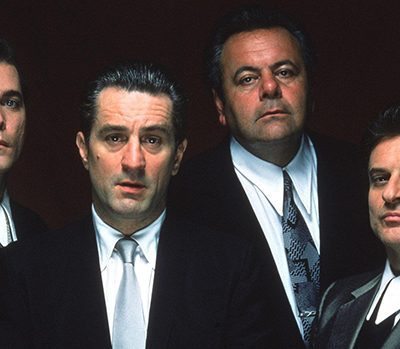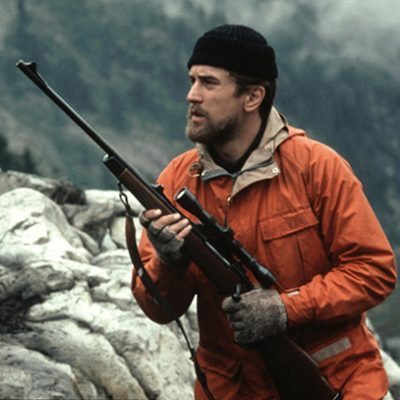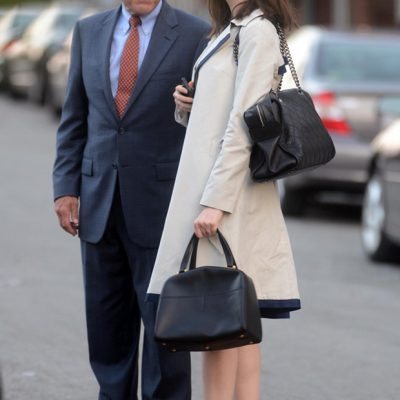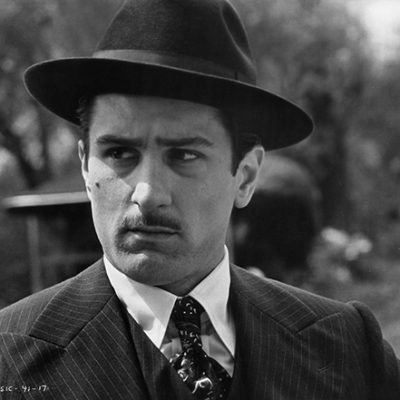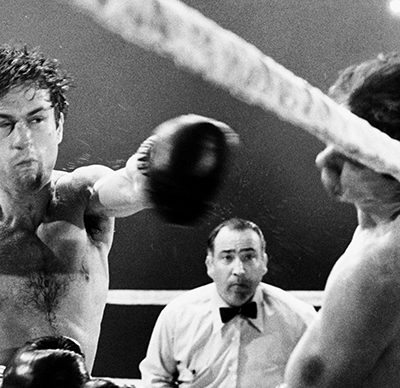
At 72, this Oscar -winning New York legend has more than 70 Hollywood projects under his belt, and a worldwide hotel and restaurant empire. In promoting his latest film, the intern, he offered advice on being relevant as you get older, and how to make rejection an ally
by susan hornik & Matt Scanlon
Donald Trump may, with dramatically varying degrees of justification, declare himself, in effect, the Big Apple’s crown prince, as even he might accede to the fact that the city has already had a king since the late 1970s, in the form of an actor and businessman born in Greenwich Village.
Robert De Niro, 72, was bred to be an artist. The son of painter and poet Virginia Admiral and abstract expressionist painter and sculptor Robert De Niro Sr., his heritage was a bit of a mixed canvas, with French, German, Irish, English, and Dutch hues. (His most direct claim to Italy was courtesy of his great grandparents Giovanni De Niro and Angelina Mercurio, who emigrated from Ferrazzano.)
Divorced when De Niro was three, his parents stayed close to their son, Robert Sr. living within walking distance of the boy’s Village neighborhood. His first acting performance was at age 10, when he took on the role of the cowardly lion in a grammar school production of The Wizard of Oz. Jumping from one private and prep school to another, he left high school education in his wake at the age of 16 to pursue acting full time, studying the craft at both the Stella Adler Conservatory and Lee Strasberg’s Actors Studio. At 20, he had his first Hollywood role in Brian de Palma’s 1963 film The Wedding Party (though it was actually released in 1969), followed by an appearance in the Roger Corman drama Bloody Mama, until he achieved a degree of legitimacy playing the fictional New York Mammoths baseball team catcher Bruce Pearson, dying of Hodgkin’s disease in 1973’s Bang the Drum Slowly.
Where De Niro truly found a connection to his New York home, and a path to Hollywood megastar status–was in his first collaboration with director Martin Scorsese, playing two-bit hood Johnny Boy in Mean Streets (also released in 1973). In 1974, at 31, he took on a role that would have intimidated an actor with twice his experience, playing Vito Corleone in The Godfather Part II, occupying and amplifying the persona formerly played by Marlon Brando with such dexterity that he won an Academy Award for Best Supporting Actor for the film.
What followed was arguably the most important actor-director synergy in Hollywood history, with De Niro taking roles in the Scorsese films Taxi Driver, New York New York, Raging Bull, The King of Comedy, Goodfellas, Cape Fear, and Casino. Famed through an early career stretch as a performer willing to accommodate physical challenges that would stymie virtually anyone else, he lost 42 pounds in order to play the lead role in Elia Kazan’s The Last Tycoon (1976), swinging to the opposite arc of the pendulum when he plumped from 145 to 215 pounds while playing boxer Jake LaMotta in Raging Bull (Scorsese related later that the film had to be closed down for four months so that De Niro could go on an extended eating trip to France and northern Italy to bulk up).
De Niro was aware early of the perils of being typecast as either mob hoods or otherwise violence-prone characters, so went out of his way to take unexpected, often comedic, roles. Long before his run as ex-U.S. intelligence operative Jack Tiberius Byrnes in Meet the Parents (and its two sequels) and his Academy Award nominated role as obsessive-compulsive sports fan Patrizio “Pat” Solitano, Sr. in 2012’s Silver Linings Playbook, performances in The King of Comedy (1983) and Midnight Run (1988) had become staples of cult fandom.
For nearly three decades now, De Niro has also expended energy in the real estate realm, investing heavily in Tribeca properties, and his media company Tribeca Enterprises runs the Tribeca Film Festival (April 13-24), which has to date attracted nearly five million attendees. Along with partners chef Nobu Matsuhisa and Drew Nieporent, his Myriad Restaurant Group owns and operates the restaurants Tribeca Grill, Nobu, Nobu London, Nobu Next Door, Nobu 57, and Bâtard.
All of which makes the themes of retirement and aging in his latest film, The Intern, especially poignant. In the film, De Niro plays Ben Whittaker, a 70-year-old widower who decides to get back in the job game by becoming an intern at a fashion website founded and run by Jules Ostin (Anne Hathaway).
“We tend to feel that when you are at a certain age, you are no longer relevant in some ways,” offered De Niro at press conference for the Nancy Meyers-directed project. “And that is just not the case. People might be aware and sensitive to that when they are younger, [but] when you get there, you certainly know it. There are a lot of those people who are there…hopefully they will see the movie.”
One of the main messages of the film, he added, is to offer respect to older people, who inevitably have much to teach.
“[Those] people are kinda sidelined in a way,” he explained. “But the point is, [my character]…he’s someone very important; if you stop and look and listen, he has advice that only someone who has been on the planet a lot longer can give.”
De Niro plays a kind of mentor to Anne Hathaway’s character. “I never had a mentor like that,” he said. “I think it’s a great thing. If you are in a certain untenable situation and you have a mentor, they can change your life,” adding that he guided himself in many ways. “I think mentoring is a great thing. I like to give advice to younger people if they ask me. I have, at times, asked people who were further on in their careers, like [Elia] Kazan or certain actors who were a generation ahead of me… asked them questions like what to look out for, and [about] their experiences. I wanted to take a short cut with some things, as I didn’t want to have to experience something if it’s going to be negative. I have some young friends and if they ask, I give them my opinion on what the situation is. I enjoy doing that.”
That opinion can occasionally get…candid. At a recent NYU Tisch School of the Arts graduation ceremony, De Niro told students: “You’re an artist—yeah? You’re fucked. The good news is that’s not a bad place to start.”
He would be in a unique position to know that. His father endeavored to gain notoriety as a painter, and De Niro paid tribute to him and that struggle earlier this year (Robert Sr. passed away in 1993) in an HBO documentary entitled Remembering The Artist.
At a press conference to promote the film, the actor had some advice for dealing with rejection.
“You just have to keep going. God helps those who help themselves,” he said. “In the film, I found myself in a very strange situation in Paris, trying to help my father who was dealing with depression; I didn’t know any better; I’d take his art from gallery to gallery, and we would walk and walk, showing it to people. The main thing is, he painted because he loved it. That kept him going—you have to steel yourself for that kind of rejection.”
He added at the same event that he offers the same advice to his children (he has six).
“I say this to my kids, ‘If you don’t go, you will never know.’ As an actor, I think in terms of an audition, so if you don’t go to an audition—if you are afraid you are going to get rejected—you won’t get anything. You just have to take chances and get out there. Whether it’s positive or negative, you’ve got to go through the experience. And this holds true for any job–whether you are a writer or singer, submitting a script, or an artist…even if people don’t respond to it in the way that you want. You hear this from famous people all the time who sent their stuff out and nobody cared, and yet there was someone who eventually did…who gave that person the exposure they needed.”
Nancy Meyers, after working with De Niro on The Intern, described the actor as a very “Zen guy” at the film’s press conference.
“On the set, there are a gazillion people running around,” she said. “And he’s just sitting there in a chair, eating a little tuna sandwich. The world can be going by…he’s just got it down, and is always there where you need him. Seeing that really helped everyone in the movie. He’s calm.”
“He is a Jedi!” quipped Hathaway.
In characteristically enigmatic fashion, De Niro glanced at the press corps and simply offered, “Sometimes.”



